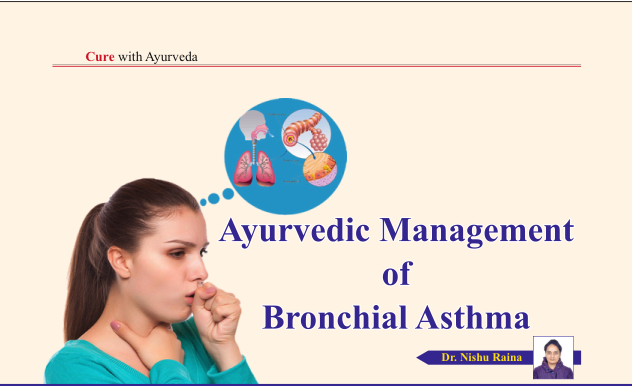Asthma is a chronic lung disorder which is caused due to inflammation in the airways which become narrower and are filled with mucus leading to blockage of the airflow. Licorice has anti-inflammatory and mucolytic properties that help in restoring normal breathing in asthmatic patients.
Asthma is a chronic lung disorder which is caused due to inflammation in the airways. The airways become narrower and are filled with mucus, blocking the airflow which then results in short gasping breaths, recurring periods of wheezing, coughing and chest tightness. If an asthma attack is not controlled in time, it can leave a person breathless. An attack could be triggered due to allergic reactions or some other triggers or stimuli like dust, smoke, fumes, or chemical or allergens like pollen and grass. In Ayurveda, the balance among three doshas namely Vata, Pitta and Kapha keeps the body in healthy state and imbalance in these doshas is causative factor for the origin of any disease. The ayurvedic texts have explained the bronchial asthma in detail where it is known as Tamaka Shvasa. The leading cause of this disease is said to be the aggravation of kapha dosha. This dosha blocks the flow of air creating spasms in the bronchial tree and gets accumulated in the respiratory tract, choking the natural flow of air resulting in asthma and wheezing. Asthma attacks may come without warnings as the patient may be sensitive to certain factors which trigger an Asthma like-
1. Anxiety and stress
2. Certain medications
3. Certain food additives
4. Perfumes and incenses
5. Extreme weather conditions
6. Extreme physical activity and exercise
7. Pollutants such as smoke and chemicals
8. Exposure to substances like dust, pollen and animal fur
Symptoms of Bronchial Asthma
The symptoms of Bronchial Asthma vary from person to person depending on aggravating factors. The common symptoms of Asthma are mentioned here
• Cough
• Wheezing
• Breathlessness
• Pain or tightness in chest
• Trouble sleeping due to breathlessness
• Whistling sound in the chest while breathing
Management of Asthma in Ayurveda
Since Bronchial Asthma is vatakaphaja disease hence the aim is to remove the excess mucus and inflammation. To achieve this purpose, ayurvedic texts have mentioned the treatment with the panchkarma which includes swedana karma (sudation), vamana karma (therapeutic emesis) and virechana karma (therapeutic purgation). Besides panchkarma, oral treatment with herbs is also described to ease asthma symptoms.
Do's & Don'ts in Bronchial Asthma
• Yoga and meditation.
• Add honey to drinks and tea.
• Avoid excessive physical exercises.
• Eat foods that are rich in anti-oxidants.
• Do not take oily, greasy and fried foods.
• Cover the mouth and nose when stepping out in cold weather.
• Avoid exposure to indoor and outdoor pollution, cigarette smoke, and allergens.
• Don't take processed foods, additives, white sugar and artificial sweeteners, cold and refrigerated foods and drinks.
Herbs Useful in Bronchial Asthma
Ginger
It helps in decreasing inflammation of mucosal lining of respiratory tract. Half a cup of ginger tea mixed with 2-3 crushed garlic cloves could prove to be an effective remedy to reduce inflammation and mucus accumulation in the airways, thereby managing asthma.
Turmeric
It helps prevent asthma attacks and keeps allergies at bay. This natural coloring herb helps controlling allergic reaction and thus reduces inflammation due to allergens. Various researches show that it could be a helpful complementary treatment for asthma.
Cinnamon
It helps in decreasing inflammation and loosening the mucus of bronchial tree and thus helps in managing asthma. Mix one teaspoon of cinnamon and 1/4th teaspoon trikatu into a cup of boiling water and drink it twice a day as a complementary treatment for bronchial asthma.
Licorice
It has anti-inflammatory and mucolytic properties that help in restoring normal breathing in asthmatic patients. It also possesses immuno modulatory activity. Drinking a tea made with half a teaspoon of licorice and half teaspoon of ginger is very good herbal tea for managing asthma.
Pippali
Pippali is widely used to treat bronchial asthma due to its anti inflammatory activity. It can be consumed regularly in the powder form with honey to prevent recurrent attacks.
Useful Ayurvedic Formulations in Asthma
• Vasavaleha
• Kantkarivaleha
• Vyaghriharitki
• Kanakasava
• Talisadi churna
• Sitopaladhi churna
• Swas kuthara rasa
• Mahalakshmi vilas rasa
Dr. Nishu Raina
Assistant Professor,
Dayanand Ayurvedic College, Jalandhar.
nishu.raina2010@gmail.com







 Dec 2024
Dec 2024
 May 2024
May 2024
 September 2022
September 2022
 April 2022
April 2022
 October 2020
October 2020
 Jan 2020
Jan 2020
 June 2019
June 2019
 January-February 2019
January-February 2019
 Augest-September
Augest-September
 April 2018
April 2018
 November 2017
November 2017
 June 2017
June 2017
 November 2016
November 2016
 September 2015
September 2015
 March 2015
March 2015
 July 2014
July 2014
 January 2014
January 2014
 July2013
July2013
 March 2013
March 2013
 May 2012
May 2012
 May 2011
May 2011
 Sep 2010
Sep 2010
 Jun 2010
Jun 2010
 Feb 2010
Feb 2010
 December 2009
December 2009
 August 2009
August 2009
 June 2009
June 2009
 Feb 2009
Feb 2009
 December 2008
December 2008
 October 2008
October 2008
 March 2008
March 2008
 July 2008
July 2008
 May 2008
May 2008